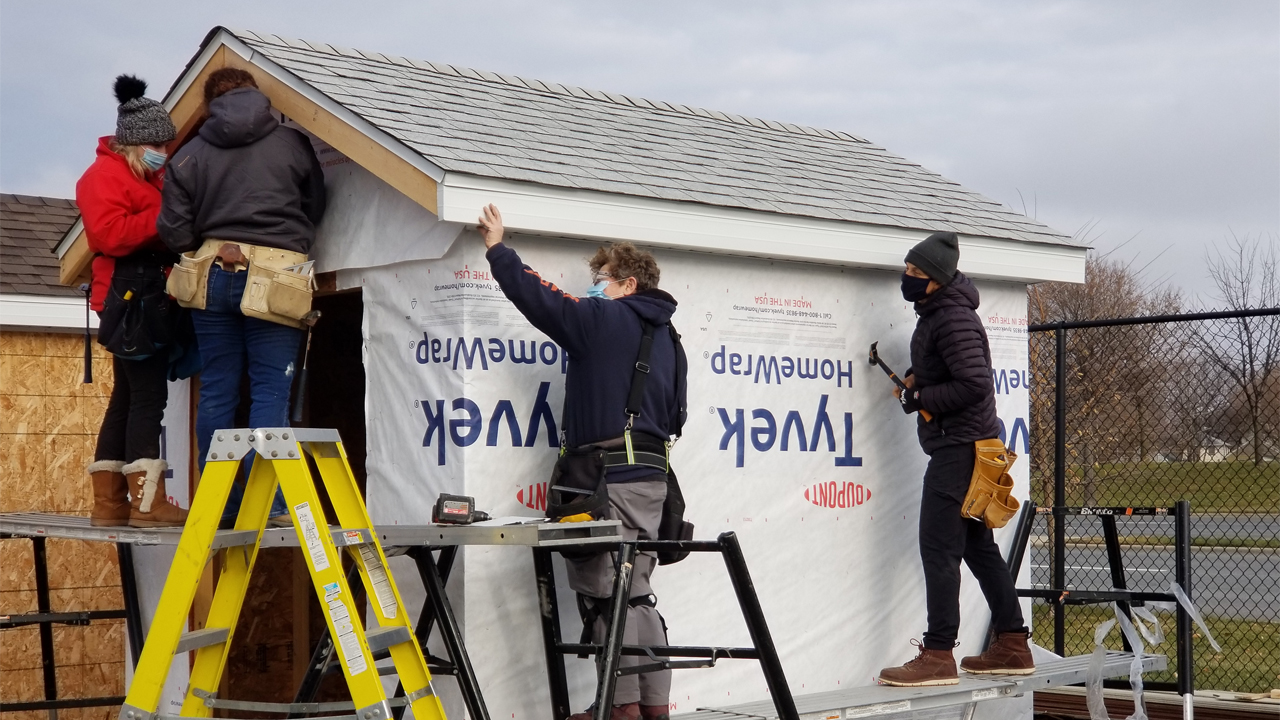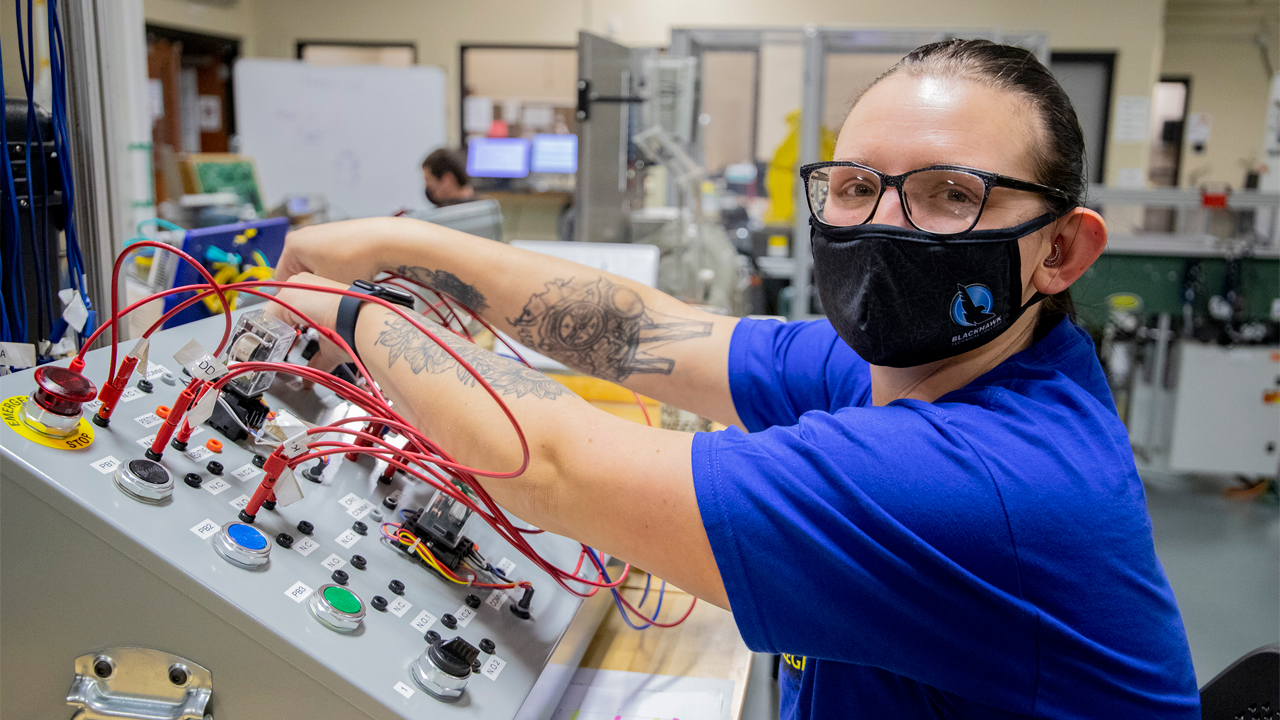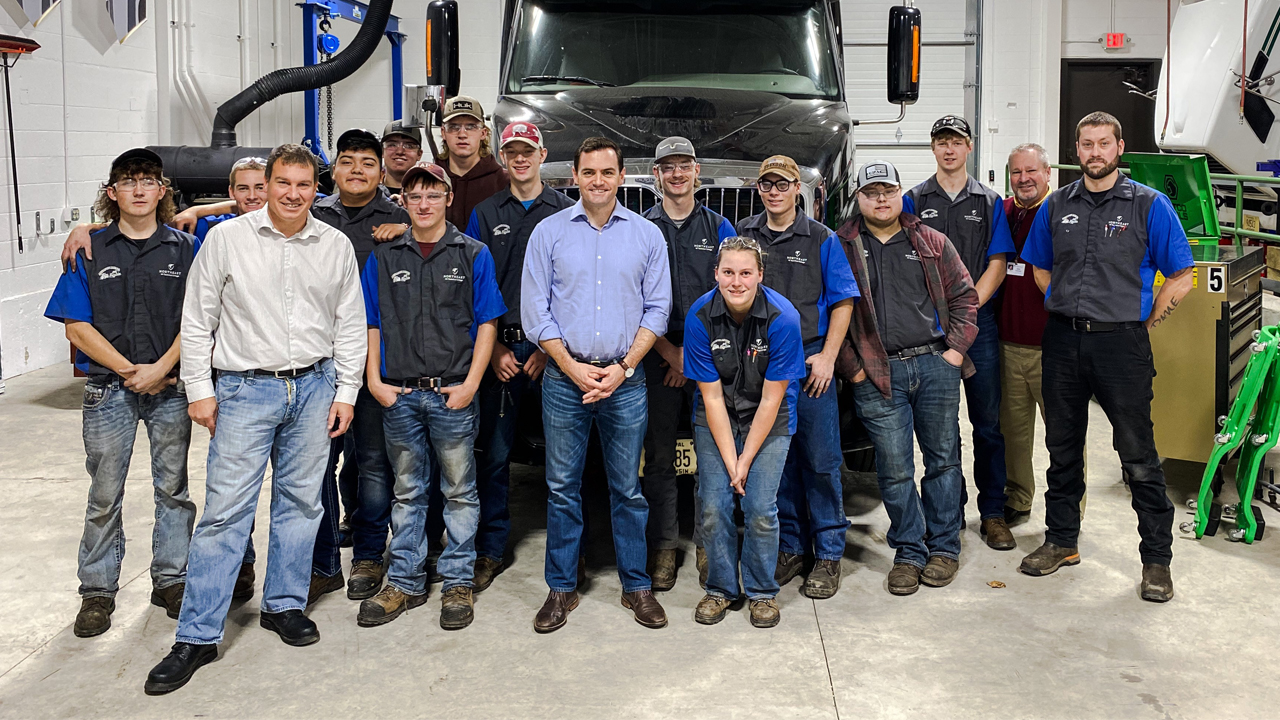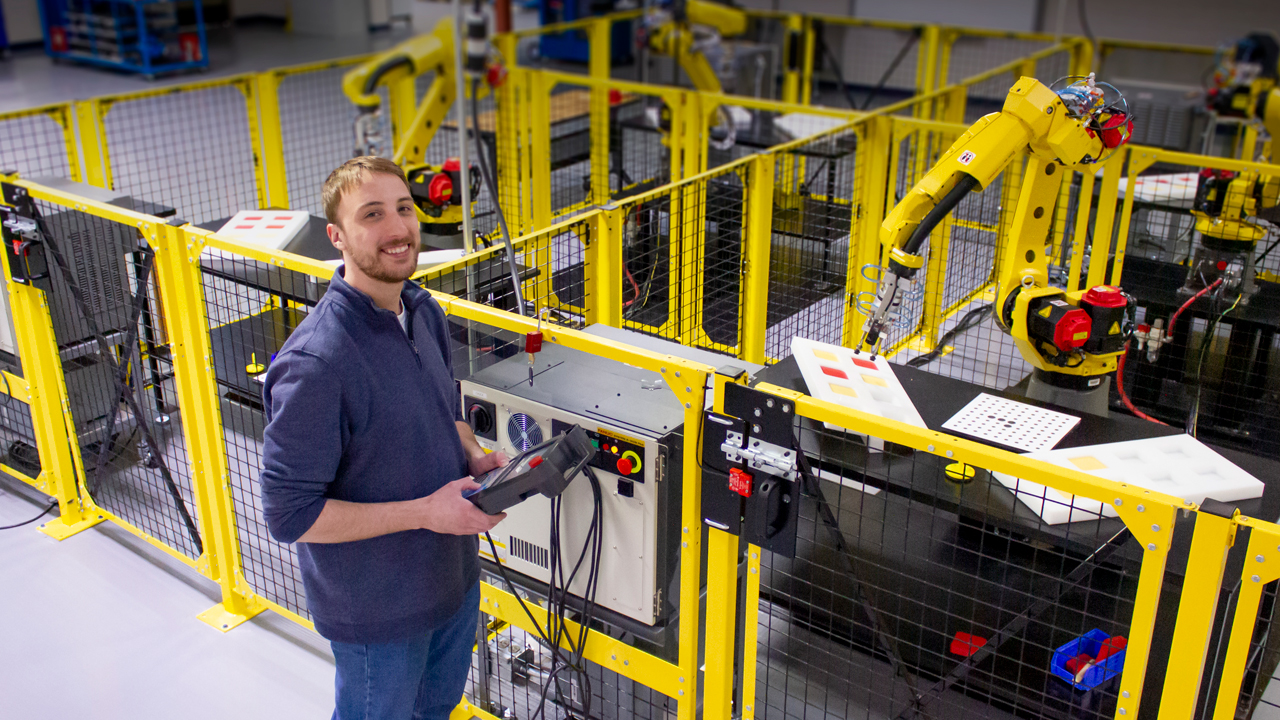A jump-start on automotive careers
Program prepares high schoolers for auto-repair jobs, and credits can be applied to college, too
In four years of teaching high school students about automotive repair, Ben Charles has seen students get jobs in auto shops, seek additional training, and decide to go in a different direction. He considers each one a success.
“I burst with joy that these students are doing what their calling is in life,” said Charles.
Charles is the instructor for the Automotive Youth Education Systems (AYES) program at Madison Area Technical College. The program, offered to high school students in 16 districts, is part of a larger initiative called the Dane County School Consortium.
Once enrolled, students attend night classes at Oregon High School the first year to learn the fundamentals of being an automotive technician. The following year, they take two courses from Charles at the Madison College Truax campus — all at no cost. They must also work a minimum of 450 paid hours in a related job.
When done, they’re ready for entry-level jobs. But the program also earns students seven credits they can apply to further studies at Madison College, such as an associate degree in automotive technology or an automotive technician diploma.
Charles meets with students two evenings a week to teach them “everything from timing belts to replacing engines, performing alignments and everything in between. We want them to understand the full scope of what this field has to offer.”
There’s lots of hands-on learning that includes diagnostics — “figuring out the root cause of an issue.” Charles, who was a diagnostician early in his career, wants students to learn the critical thinking skills necessary for solving puzzles they’ll encounter in auto-repair shops.
The most common jobs Charles sees students land right out of the program are at independent automotive repair shops and dealerships. Applying credits to further education opens up more opportunities. But even students who decide not to pursue automotive work will take away practical skills they can use to maintain and repair their own cars.
“Really, this is fault-free trying something out,” said Charles. “You can find out if (automotive work) is right for you. If anyone is interested at all, they should go for it.”
Automotive Youth Educational Systems at Madison Area Technical College
- Good if you: Love cars and like to work with your hands.
- You’ll earn: Seven transferrable college credits while attending high school.
- Length, if full-time: 1 school year while in high school, with the option to apply credits to a degree or diploma.

Wielding hammers, building job skills
An increasing number of women are realizing the benefits of construction training
When Allie Berenyi started teaching in the construction and remodeling program at Madison Area Technical College, she taught up to 16 students per year. Today it’s closer to 70 students, 40 of whom are on a path to a technical diploma. And more and more of them — one-third of this year’s daytime students — are women.
Berenyi said the fact that she’s one of two women faculty members is one reason: “Representation matters. It allows women to imagine themselves following a trades pathway.” She and colleague Sandy Thistle have a combined 60 years in the trade, each with complementary areas
of expertise.
“I firmly believe we create access by reflecting those people in the community who don’t look like traditional construction workers,” said Thistle, echoing Berenyi’s observation. The two have worked hard to recruit under-represented students of all kinds, in part because that’s what the market needs. “The industry needs bodies to do the work,” said Thistle. “The best source of these bodies is through populations previously excluded from this domain.”
Word-of-mouth has helped as students of all kinds learn the program’s benefits, which include many different job options.
“Some go on to commercial construction where they might complete an apprenticeship,” said Berenyi, who is co-director of the program. “From there they can become journeyworkers and perhaps project managers or superintendents.” Others go into residential construction and remodeling. There’s plenty of room to transition to estimating, sales or project management.
“Our students have successfully started their own businesses, repaired pianos, gone into commercial construction, become supervisors, become teachers, expanded existing businesses, gone into other trades, flipped houses, and found any number of other satisfying related work,” said Thistle.
One woman even worked at a national park to repair and rebuild historic buildings, Berenyi said. “Another grad spent several summers and a few winters doing carpentry and construction work in Antarctica and Greenland.”
Students learn safety procedures, how to use prints and specifications and all phases of home construction including estimating materials, understanding building codes and maintaining tools and equipment. There’s plenty of hands-on work framing floors, installing shingles, installing trim and much more.
“Each year the students build a tiny house right here on campus,” said Berenyi. “It’s an excellent way for them to learn how all the elements of a residential building project fit together.”
Construction and Remodeling program at Madison Area Technical College
- Good if you: Like to be active, accomplish something daily.
- You’ll earn: A technical diploma.
- Length, if full-time: Nine months.

Career paths paved by automation
Educators respond as employers look for people to support their technology advancements
Technical colleges across Wisconsin keep their fingers on the pulse of the state’s manufacturing economy to know what skills are in demand. At Western Technical College, educators were seeing one item rising to the top of the list: the Internet of Things (IoT).
Western Tech’s new program to train people in this area — launched in the fall 2021— came about by keeping in close touch with industry leaders and their needs, said instructor Joseph Servi.
Western Tech partnered with companies like Kwik Trip and Ashley Furniture on the program’s design to ensure there is demand for the program. “These companies are continuing to advance and introduce more automation in their manufacturing process.” The goal, said Servi, is that Western Tech graduates help make that happen.
Western Tech is the only technical college in Wisconsin to offer a specific IoT program with a focus on manufacturing, said Servi. The program is designed to give students lots of exposure to the technology they’ll encounter in the manufacturing environment along with core knowledge in areas such as safety circuits and automation systems integration. “This gives our students more flexibility in their fields,” he said.
IoT involves the interaction of smart objects — objects with embedded sensors, onboard data processing capability and a means of communication — to provide automated services. If you hear a device or a piece of equipment described as “smart,” it has something to do with IoT.
This technology can be applied to almost any device you can think of in the home, community and workplace, from heating systems to agriculture, from your refrigerator to the bus you ride. It can also be applied to sophisticated manufacturing processes.
“The Internet of Things is becoming more and more of a common idea,” said Servi. “As we start connecting the world to the internet within industry, commercial sectors, and even our own homes, the demand for people with a keen understanding of how that’s even possible will only grow.”
Having an interest in the internet and networking “is a must” for IoT students, said Servi.
Career opportunities in addition to IoT specialists include network deployment technician, integration team engineer, field service technician and electronics technician.
Internet of Things Integration Specialist program at Western Technical College
- Good if you: Have a curious and technical mind, are willing to work with your hands.
- You’ll earn: An associate of applied science degreeerrable college credits while attending high school.
- Length, if full-time: Two years.

Meeting manufacturing’s newest needs
Workplace changes are driving a demand for advanced manufacturing technicians
Automation might sound like a way to eliminate jobs, but it’s exactly why Blackhawk Technical College launched its Manufacturing Engineering Technology program, which enrolled its first students in the fall 2021.
Automation and other changes in manufacturing have driven demand for advanced manufacturing technicians, said Bryan Coddington, engineering technology instructor at Blackhawk. “Embracing technologies like Industry 4.0 and the Industrial Internet of Things (IIoT) will provide a path for manufacturers to be more efficient.”
Blackhawk’s new associate degree program aims to prepare students for those opportunities with a program that’s broad in scope, said Coddington. Students must take nine credits in the areas of automation, quality and design. If they choose all nine credits from the same focus area, they’ll receive an additional technical diploma in that discipline. “The additional credential will help students gain employment that fits their specific interests,” Coddington said.
“Students who graduate from this program will be in the position to obtain a great career with excellent opportunity for advancement,” said Coddington. Just some of the job possibilities: manufacturing engineer technician, automation engineer technician, quality control specialist, design engineer and production engineer.
The program takes a “multilayered approach” to learning, said Coddington, through innovative training methods, internship opportunities, hands-on projects and lab-based manufacturing opportunities. Internships are required, preferably paid. The program is lining up collaborations with industry partners to develop work-based learning opportunities.
Also in the works: Building an automated manufacturing cell on campus that engineering technology students can use to design a product. In doing so, they’ll learn to use Industry 4.0 and IIoT principles and experience automated manufacturing. “The ultimate goal being a lights-out manufacturing facility” that will give students even more hands-on experience.
Students will learn the fundamentals of materials selection, tooling, assembly and automation, and how to apply them to production-related activities. The program will prepare them to assist in the development of new products and the improvement of production processes.
“This program is great for someone who likes to learn how things work and how to make things work better,” said Coddington. “A big part of manufacturing engineering is improving the efficiency of a process or product.”
Manufacturing Engineering Technology program at Blackhawk Technical College
- Good if you: Enjoy science, math, programming and working with your hands.
- You’ll earn: An associate degree.
- Length, if full-time: Two years.

Skills for the modern workplace
Preparing students to get the job done through problem-solving, teamwork and high-tech labs
According to a 2021 survey from Wisconsin Manufacturers & Commerce, a whopping 86% of manufacturers who responded said they’re struggling to hire workers. Moraine Park Technical College wants to equip people to fill those jobs with its newly revamped Quality and Advanced Manufacturing Technology program.
Previously known as Process Engineering Technology, the program was changed in response to the evolving needs of Wisconsin manufacturers, said Tom Roehl, an instructor with the program. To reflect the current skill sets that are in demand, more automation components have been added to the program, among others.
The goal: prepare students to work with automated systems to improve efficiency and quality in a manufacturing environment. To do this, students use high-tech labs to learn the latest technologies used in manufacturing. Problem solving and teamwork are stressed along with technological knowledge.
The new program doesn’t hone in on one particular specialty, as some programs do. Students who get a Quality and Advanced Manufacturing Technology degree will be prepared to work in a number of manufacturing fields, Roehl said. “This is achieved by providing foundational skills in many areas including quality, CNC (computer numerical control), design, and automation.”
Students are exposed to a variety of areas, and the ones that inspire them can guide their career paths, future training, and possible future education choices. Career opportunities include continuous improvement technician, quality assurance technician, CNC programmer and robotics and material-handling technician, to name a few. Roehl says previous graduates have gone on to roles as team leaders, and plant managers, too.
Students completing the degree will understand how to apply lean manufacturing principles, develop a quality control plan, design a product or prototype, program automated machines and more.
“This program is great for someone who is interested in how things get made, and for someone that enjoys seeing the results of their work,” said Roehl.
Many students combine their studies with real-world experience by working full- or part-time in the industry while attending school.
Quality and Advanced Manufacturing Technology program at Moraine Park Technical College
- Good if you: Enjoy technology and don’t want to sit at a desk all day.
- You’ll earn: An associate of applied science degree.
- Length, if full-time: Two years.

No place to go but up!
Keeping cellular networks on takes skills, training
The chance to travel, a good salary and benefits, and lots of job opportunities are just some of the reasons to be a telecommunications tower technician. But the people behind a brand-new training program also talk about another benefit: the spectacular views.
“Sometimes we’ll see the most amazing sunrises or sunsets,” said Max Walski, who worked as a tower tech for almost nine years, sometimes climbing 600 feet. “Really, nothing can describe it.”
Walski joined Northeast Wisconsin Technical College (NWTC) to help launch its new Telecommunication Tower Technician program, created in response to a need for telecom technicians. He’s enthusiastic about passing his experience along to students.
Walski credits the occupation with propelling his own success. In addition to those great views, he loved the camaraderie and the chance to be in the forefront of new telecom technology — not to mention the income opportunities. “I bought a house before a lot of my buddies could even start thinking about those kinds of things.”
Telecom tower technicians specialize in the installation, servicing, maintenance, and decommissioning of cell phone towers. They work with a variety of hardware, including coaxial cables, antenna, radios, and fiber-optic cables. Not all towers are 600 feet high – some might be on the top floor of a parking garage – and there’s plenty of ground-level work, too.
NWTC’s program is the only one like it in the Midwest, said Howard Herrild, associate dean of trades and engineering. “There’s high job demand and they’re great-paying jobs,” Herrild said. With expanding 5G networks and the federal government’s plan to invest in telecom infrastructure, the timing for the new program is just right.
In the Technician 1 Certificate program, students learn safety and basic rigging; principles of electricity, fiber optics, wireless technology, and cell components; antenna basics; and spectrum management. NWTC has a practice tower and agreements to use training towers at local carriers. “So students are getting with this certificate real-word climbing experience,” Herrild said.
Someone earning the technician certificate could get started tower-climbing then return for more education in multiple telecom areas. NWTC’s new program offers other degrees and certificates that can lead to jobs in external or outside design and inspection, design and engineering, drafting and more. “There is a myriad of opportunities,” said Walski.
Telecommunication Tower Technician program at Northeast Wisconsin Technical College
- Good if you: Are hands-on, adventurous, like to travel.
- You’ll earn: A Tower Technician 1 Certificate.
- Length, if full-time: Six months.

A home-grown idea
Schools team with college to cultivate a new crop of diesel technicians
Where there are farms, there is machinery. And where there’s farm machinery, there are diesel engines that need maintenance and repair.
That’s why three school districts teamed up last year with Northeast Wisconsin Technical College to extend the college’s diesel technology program to high school juniors and seniors. It was a natural fit, since NWTC already offered five diesel programs in response to demand by the region’s agriculture, trucking and construction industries.
Students in the Luxemburg-Casco, Denmark and Kewaunee school districts now have the opportunity to earn credits toward high school graduation while earning a one-year diesel maintenance technician technical diploma, said Gene Francisco, NWTC associate dean of trades and engineering. “They will actually walk across our stage before they walk across their own, which is kind of a neat thing.”
With the technical diploma they can get jobs maintaining and repairing diesel equipment “no matter what industry, whether it’s on a farm or in construction or for a fleet of trucks going on the road,” said Francisco.
The credits can also be applied toward the first year of study in NWTC’s Diesel Truck or Diesel Heavy Equipment programs, where students can specialize their skill sets. Career opportunities include diesel and heavy equipment technician, specialist technician and parts support manager. Additional opportunities include industry-related service manager, supervisor, sales representative, business owner and educational trainer.
Classes are held during normal school hours at the Ahnapee Diesel Center, which opened in September 2021 in the former Casco High School building. It’s the first diesel-only high school education program in Wisconsin and one of roughly 20 such programs nationwide.
It has already made a difference for at least one farm family. After three months, one student was “already working on her parents’ diesel trucks for their farm,” Francisco said. “She’s a junior and she’s really excited about continuing on with it.”
The center “replicates very much what you’re going to see in the real world in a shop,” said Francisco. “(Students) spend as little time as possible sitting in a lecture seat. Most of their time is hands-on.” They work on equipment loaned by the district, the college and industry partners who understand how important it is to train more diesel technicians. “The field is just screaming for these folks.”
Industry partners also provide job opportunities for students, who are encouraged to work in the field while they’re enrolled. “Some of them are making pretty good money, too.”
Diesel maintenance and technology programs at Northeast Wisconsin Technical College
- Good if you: Like using hands-on skills to solve problems.
- You’ll earn: Either a technical diploma or associate degree.
- Length, if full-time: One or two years.

visits the center.
Retooling for new demands
Technicians who know both mechanical and electrical maintenance are in high demand
Robin Reese often pulls up job websites to show his electro-mechanical maintenance students all the openings in the field. One day, a student approached him at the end of class with a startling admission.
Not only had the student applied to one of the jobs on the spot while Reese was conducting class, he had already scheduled an interview. If hired, he’d get a $5,000 signing bonus.
“This really showed me that employers really are in need of people with these skills,” said Reese, an instructor at Lakeshore Technical College.
That demand has driven updates to Lakeshore Tech’s Electro-Mechanical Maintenance Technician program, recently retooled to reflect the increasing responsibilities of people going into the field.
Previously, Lakeshore had programs in Electro-Mechanical Automation — essentially, how to dive in electrically and reprogram an automated system — and Maintenance Technician — how to tear apart and repair mechanical equipment. But these days, “maintenance technicians are being asked to know everything from simple lubrication and greasing to troubleshooting complex automated systems,” said instructor Jim Gruenke.
So, the Electro-Mechanical Maintenance program was created to train students both to tear apart and repair mechanical equipment and to troubleshoot electrical systems and programs.
Students can still pursue the separate paths if they choose, or they can build on different areas of study over time. Lakeshore’s program makes a variety of options available — including additional education in Electrical Engineering Technology at UW-Green Bay or UW-Oshkosh. “Both colleges accept 60 of the 68 credits earned,” said Gruenke.
Gruenke, who coordinates the electro-mechanical program, has been hearing for eight years about a shortage of skilled maintenance personnel. “The effect of this skills gap has been increased pay for skilled trades, college re-imbursement, flexible hours to enable students to attend school, and promotion opportunities,” he said. And considering the cost of a technical college, “the earnings-to-cost ratio is better than any four-year degree.”
Job titles in this field include electro-mechanical technicians, controls technicians, industrial machinery mechanics, machinery maintenance workers, millwrights and robotics technicians.
“’Now Hiring’ signs are everywhere,” said Reese. “Wages are increasing faster than I have ever seen in my past 25 years.“
And that student who applied while in Reese’s class? “Yes, he did get the job.”
Electro-Mechanical Maintenance Technician program at Lakeshore Technical College
- Good if you: Like the challenge of repairing things, both mechanical and electrical.
- You’ll earn: An associate degree.
- Length, if full-time: Two years.

